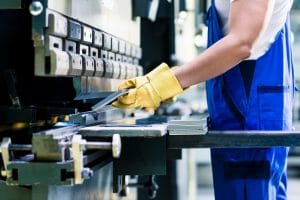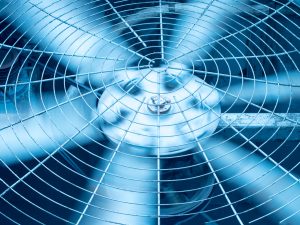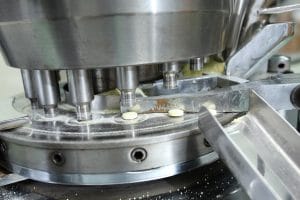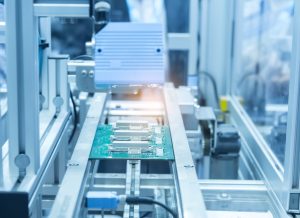 When it comes to electrical thermal management, there are several considerations beyond how effectively a system can operate without overheating. For instance, air conditioners can successfully accomplish this goal for prolonged periods of time, but the costs of energy and maintenance associated with them often make them cumbersome in many ways. They also make it more difficult for companies to successfully transform their operations to become greener and more eco-friendly. In addition to reinventing the way electrical enclosures are cooled, heat exchangers also help address the increasingly more pressing concern of going green. (more…)
When it comes to electrical thermal management, there are several considerations beyond how effectively a system can operate without overheating. For instance, air conditioners can successfully accomplish this goal for prolonged periods of time, but the costs of energy and maintenance associated with them often make them cumbersome in many ways. They also make it more difficult for companies to successfully transform their operations to become greener and more eco-friendly. In addition to reinventing the way electrical enclosures are cooled, heat exchangers also help address the increasingly more pressing concern of going green. (more…)
What Companies Save with the Help of Heat Exchangers
 Saving costs has always been a principle of good business, but there are some costs that have historically been a necessary burden. For example, electrical thermal management used to require large air conditioning apparatus that was costly to operate and cumbersome to maintain. However, the need to prevent machinery and equipment from overheating is so great that those costs and frequent maintenance were simply par for the course. For many applications, that all changed with the advent of heat exchangers, which offered even more consistent electrical cooling without the additional costs that come with more conventional methods. (more…)
Saving costs has always been a principle of good business, but there are some costs that have historically been a necessary burden. For example, electrical thermal management used to require large air conditioning apparatus that was costly to operate and cumbersome to maintain. However, the need to prevent machinery and equipment from overheating is so great that those costs and frequent maintenance were simply par for the course. For many applications, that all changed with the advent of heat exchangers, which offered even more consistent electrical cooling without the additional costs that come with more conventional methods. (more…)
How Heat Exchangers Cool Control Panels Better
 While advanced manufacturing and other forms of technology become increasingly more diverse, they still rely on concepts like electrical enclosures and control panels to power that technology. Because these enclosures and panels hold the most powerful components of electrical equipment, they are often the focal point of a system’s electrical waste heat. Therefore, electrical enclosures and control panels are often the most important focuses of advanced thermal management solutions, such as heat exchangers that effectively and efficiently cool electrical enclosures of all sizes. In most cases, heat exchangers cool control panels better and with higher energy efficiency than other modern thermal management solutions. (more…)
While advanced manufacturing and other forms of technology become increasingly more diverse, they still rely on concepts like electrical enclosures and control panels to power that technology. Because these enclosures and panels hold the most powerful components of electrical equipment, they are often the focal point of a system’s electrical waste heat. Therefore, electrical enclosures and control panels are often the most important focuses of advanced thermal management solutions, such as heat exchangers that effectively and efficiently cool electrical enclosures of all sizes. In most cases, heat exchangers cool control panels better and with higher energy efficiency than other modern thermal management solutions. (more…)
Why More Manufacturers Rely on Heat Exchangers These Days
 The faster and more efficient the manufacturing process, the more companies benefit from higher profits and higher quality goods. However, maintaining that quality is about more than just speed, it’s also about making sure every element of the process is optimized, including electrical thermal management. The most powerful manufacturing technologies and equipment have to be properly cooled on a consistent basis. Otherwise, overheating could lead to frequent malfunctions and early breakdowns that end up costing companies much more in the long run. Now, more manufacturers in virtually every industry are relying more heavily on advanced heat exchangers, and these three reasons highlight why. (more…)
The faster and more efficient the manufacturing process, the more companies benefit from higher profits and higher quality goods. However, maintaining that quality is about more than just speed, it’s also about making sure every element of the process is optimized, including electrical thermal management. The most powerful manufacturing technologies and equipment have to be properly cooled on a consistent basis. Otherwise, overheating could lead to frequent malfunctions and early breakdowns that end up costing companies much more in the long run. Now, more manufacturers in virtually every industry are relying more heavily on advanced heat exchangers, and these three reasons highlight why. (more…)
Thermal Management Concepts Leading Up to Heat Exchangers
 The knowledge that electrical components generate heat and that heat can damage those components if not removed has guided technology’s creation and use for generations. However, the ability to remove that heat effectively and efficiently, with minimal effort and maximum results, hasn’t always been possible. Over the last century, the concepts behind electrical thermal management have changed drastically in every industry. From cooling large electrical equipment and control panels to allowing for smaller, more powerful forms of technology, heat exchangers are today’s go-to for advanced thermal management solutions. Yet, it took a while before they were successful enough to become the norm. (more…)
The knowledge that electrical components generate heat and that heat can damage those components if not removed has guided technology’s creation and use for generations. However, the ability to remove that heat effectively and efficiently, with minimal effort and maximum results, hasn’t always been possible. Over the last century, the concepts behind electrical thermal management have changed drastically in every industry. From cooling large electrical equipment and control panels to allowing for smaller, more powerful forms of technology, heat exchangers are today’s go-to for advanced thermal management solutions. Yet, it took a while before they were successful enough to become the norm. (more…)
Why Are Heat Exchangers Considered Eco-Friendly?
 With such a wide range of benefits compared to other thermal management solutions, heat exchangers offer enough benefits that it can often be difficult to pinpoint which is the most important. For instance, keeping technology consistently cool is vital to preventing it from overheating, which is essential to any company’s continued operations. However, doing so efficiently and with minimal energy costs is just as important to helping companies keep their overhead manageable enough to afford sustainable growth. Likewise, the low-cost and low-energy benefits of heat exchangers mean they’re also more eco-friendly, which is becoming an increasingly more essential component to operating in the 21st century. (more…)
With such a wide range of benefits compared to other thermal management solutions, heat exchangers offer enough benefits that it can often be difficult to pinpoint which is the most important. For instance, keeping technology consistently cool is vital to preventing it from overheating, which is essential to any company’s continued operations. However, doing so efficiently and with minimal energy costs is just as important to helping companies keep their overhead manageable enough to afford sustainable growth. Likewise, the low-cost and low-energy benefits of heat exchangers mean they’re also more eco-friendly, which is becoming an increasingly more essential component to operating in the 21st century. (more…)
How Dangerous Is Condensation for Electrical Enclosures?
 The trick to implementing effective electrical thermal management solutions isn’t just efficiency, but also the level of protection the solution provides for itself and the enclosure it’s attached to. While that protection most frequently involves ingress protection against environmental factors, including moisture, it also includes some level of defense against any moisture developing within the enclosure and coming into contact with sensitive electrical equipment. Condensation can form within the enclosure from a number of reasons, but for conventional systems like air conditioners, it occurs more frequently. With heat exchangers, companies can do more to effectively protect enclosures from internal condensation as well as other potentially hazardous factors. (more…)
The trick to implementing effective electrical thermal management solutions isn’t just efficiency, but also the level of protection the solution provides for itself and the enclosure it’s attached to. While that protection most frequently involves ingress protection against environmental factors, including moisture, it also includes some level of defense against any moisture developing within the enclosure and coming into contact with sensitive electrical equipment. Condensation can form within the enclosure from a number of reasons, but for conventional systems like air conditioners, it occurs more frequently. With heat exchangers, companies can do more to effectively protect enclosures from internal condensation as well as other potentially hazardous factors. (more…)
More Advantages of Industrial Heat Exchangers
 While they may not always be ideal for every single thermal management application, heat exchangers have provided far more advantages to nearly every industry than most other solutions. That’s because the variety of benefits they provide have helped most companies streamline their electrical and other thermal management processes enough to impact their entire organizations. Today, we take a look at a few of those advantages and why they’ve made heat exchangers a staple of most companies’ technology. (more…)
While they may not always be ideal for every single thermal management application, heat exchangers have provided far more advantages to nearly every industry than most other solutions. That’s because the variety of benefits they provide have helped most companies streamline their electrical and other thermal management processes enough to impact their entire organizations. Today, we take a look at a few of those advantages and why they’ve made heat exchangers a staple of most companies’ technology. (more…)
Pharmaceutical Manufacturing Benefits from Heat Exchangers
 Like many other manufacturing processes, pharmaceutical manufacturing involves several different thermal management challenges. The most common is the need to efficiently and reliably keep advanced technology and equipment properly cooled so they don’t overheat and malfunction or break down altogether. However, the unique nature of pharmaceutical products also comes with several unique challenges for ensuring consumers consistently receive high-quality products. For instance, precise thermal management is necessary for the creation of pharmaceutical products, as well as the proper storing, packaging, and shipping of these products, and in most cases, heat exchangers provide the high-performance solutions that modern companies need. (more…)
Like many other manufacturing processes, pharmaceutical manufacturing involves several different thermal management challenges. The most common is the need to efficiently and reliably keep advanced technology and equipment properly cooled so they don’t overheat and malfunction or break down altogether. However, the unique nature of pharmaceutical products also comes with several unique challenges for ensuring consumers consistently receive high-quality products. For instance, precise thermal management is necessary for the creation of pharmaceutical products, as well as the proper storing, packaging, and shipping of these products, and in most cases, heat exchangers provide the high-performance solutions that modern companies need. (more…)
What’s the Best Way to Cool Automated Technology?
 As more companies implement various forms of automated technology into their operations, they’ve enjoyed a number of different benefits, including higher productivity and more time for employees to be more innovative. It’s also presented quite a few challenges, especially in the realm of electrical thermal management. For example, traditional methods like air conditioning units and air compressors often can’t keep up with the high-performance demands of the technology. Also, automation is rendered ineffective if the equipment’s thermal management solutions have to be constantly maintained and repaired. To address these concerns, many forms of automated technology come equipped with innovative heat exchangers that offer high-performance cooling on a consistent basis with little or no need for attention. (more…)
As more companies implement various forms of automated technology into their operations, they’ve enjoyed a number of different benefits, including higher productivity and more time for employees to be more innovative. It’s also presented quite a few challenges, especially in the realm of electrical thermal management. For example, traditional methods like air conditioning units and air compressors often can’t keep up with the high-performance demands of the technology. Also, automation is rendered ineffective if the equipment’s thermal management solutions have to be constantly maintained and repaired. To address these concerns, many forms of automated technology come equipped with innovative heat exchangers that offer high-performance cooling on a consistent basis with little or no need for attention. (more…)







